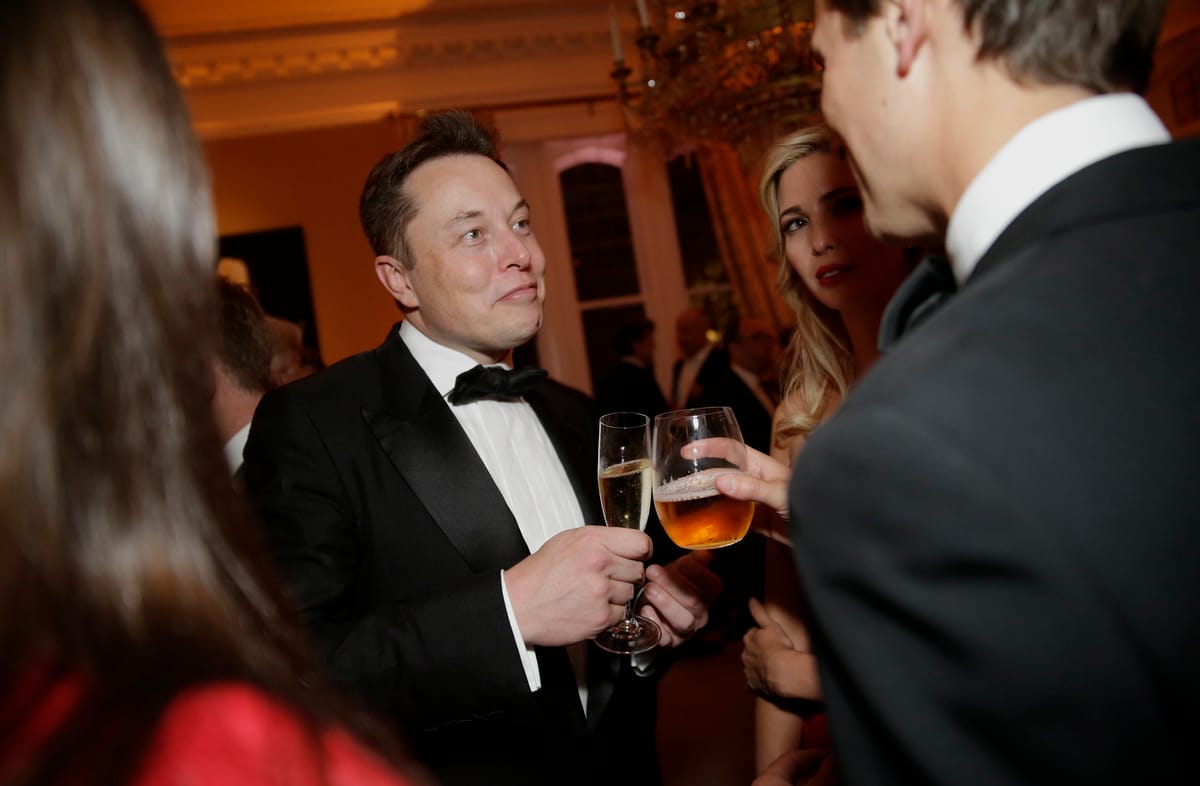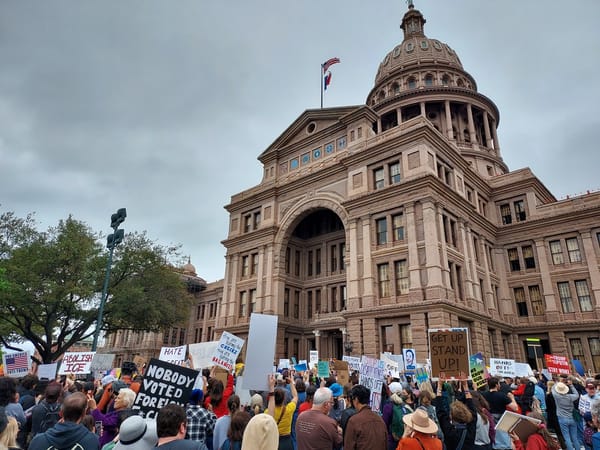Elon Musk Is a Bigger Short Term Threat Than Trump
We need to rally against his insurgency in the federal government, and we need to do it now.

I will not beat around the bush: the Trump administration offers many possible paths to catastrophe, but at this very moment, none are more likely nor able to come about more quickly than those delivered by Elon Musk specifically. Anything we can do to strike at him, to drive a wedge between him and Trump, we must do. If state governments can find the political will to seize his assets and destroy the basis of his wealth, they should. If foreign governments can, they should do the same. The systems that Musk is mucking around in could very well destroy the credit of the country and send us into the greatest crisis of the past century, at least.
How did it come to this? For most of the 2024 cycle, we focused on Trump, his authoritarian threats, and Project 2025. Musk joined Trump’s cause quite late in the election—roughly the beginning of October. He quickly became the campaign’s single largest donor. Beyond his money, he invested his time and energy trying to stand up a last minute ground game in crucial swing states, almost certainly breaking multiple serious election laws in the process. After the election, he practically moved into Trump’s home at Mar-a-Lago.
At first there was reason to suppose he would be just another in a long string of Trump courtiers who thought they could be the power behind the throne. If the pattern held, at some point the attention that Musk personally received would hurt Trump’s fragile ego and that would be the end of Musk’s insider access to the president.
It even seemed like others close to Trump might have successfully created some distance, quite literally, by ensuring that Musk would not be able to base his operations within the west wing.
It is still early, but these hopes now appear to be optimistic. While the lion’s share of Trump’s executive orders clearly have Project 2025 as their origin, and other moves are quite consistent with what he promised his entire campaign, the more immediately catastrophic decisions have clearly originated from Elon Musk personally. Indeed, with the spending freezes and the buy-out offer emails, the administration is quite clearly following Musk’s playbook in almost the identical manner he implemented it when he acquired Twitter.
Over at CNN, Zachary B. Wolf observed that We do not know what exactly Elon Musk is doing to the federal government. One question among many that was unanswered at the time of writing was “Has he taken an oath, like the federal workers he apparently has plans to fire, to uphold the Constitution?” It now appears that he may have, according to the White House, but the particulars are vague.
Wolf is not alone in wondering what, exactly, Musk’s role is in the administration, or what the practical limits are on his ability to act. The known details are sparse but telling: we know he has an office, with people nominally under his “DOGE” remit, though we do not know if they or he are actually on the federal payroll or have any other formal relationship to the executive branch or federal government in general. More significantly, the Office of Personnel Management has been staffed with people with strong ties to Musk and his allies. Others have been placed at the General Services Administration; there may be more in the future, and there may be more now that have yet to be reported on. These people are employees of the federal government, and definitely do not have a formal reporting relationship to Musk. Nevertheless, the evidence we have indicates they’re following his lead. Many of them have worked at his companies, some even worked specifically on the Twitter takeover.
Shortly after Trump’s victory, I warned that the biggest proximate risk was that he would take our system down the path of personalism. Of course, at the time, I meant the risk that the administration would expand the personal power of Trump specifically. We have seen that, of course, from a number of moves the administration has made. But no one has seen their personal power balloon more than Musk’s appears to have. His lackeys have run rampant throughout the government over the last few days, gaining access to critical tech infrastructure and sensitive information, in some cases locking out the very people who are meant to use it.
The scholar of non-democratic systems Xavier Márquez has pointed out that personalist systems where patronage is the central component “are characterized by high levels of de-institutionalization, where formal authority is no longer a good guide to the location of power.” Far more than Trump himself, this statement describes Musk, whose unparalleled personal wealth, control of multiple companies, and network of personal and financial ties, put him in a unique position even in an administration staffed by multiple billionaires. So long as the lower level clients remain, it’s unclear that even removing Musk himself from his nebulous position in the administration would do much to dampen his influence.
The de facto power of the Musk network stands to grow enormously if they successfully consolidate their control over federal systems and information channels. Even if they cannot wield it very skillfully, we ought to be alarmed. In the short term, unskillful meddling in systems that disburse trillions of dollars a year could very well cause damage they are unable to patch up after the fact, even if they fail to permanently establish an authoritarian regime.
More than any other actor right now, more than Trump himself, we need to be focusing on Musk and his agents. Whether it’s the spending freeze, terrorizing federal officials, or seizing control of sensitive systems, the actions that pose the most immediate threat to America and the world all have one source: Elon Musk.
A personalist triumphs when everyone else’s power hinges on their dependency to the personalist. Even if we cannot bankrupt Musk or bring him to justice for his many federal crimes, there are things that can be done to make him more dependent on his GOP backers and on Trump in particular than they are on him. This then leaves him actually vulnerable should Trump choose to abandon him at some point.
Any state government that can be persuaded that they ought to step in where the federal executive government has abandoned its duty and punish Musk for breaking crucial laws should seize any assets he has there. They should ban the sale of Tesla in their states and the trading of its stock on any exchange based there.
As for the rest of us, we need to be calling our representatives, including our state representatives, and demanding they take every available measure to hold Musk accountable. We should support opposition media that have been drawing attention to every step Musk and his lackeys have taken; Wired has been particularly effective at this. And when Musk unilaterally reduces the federal workforce or shuts down an agency—something which appears to be imminent—we must be prepared to take to the streets and demand that he be stopped.
Featured image is Elon Musk, by Haddad Media




